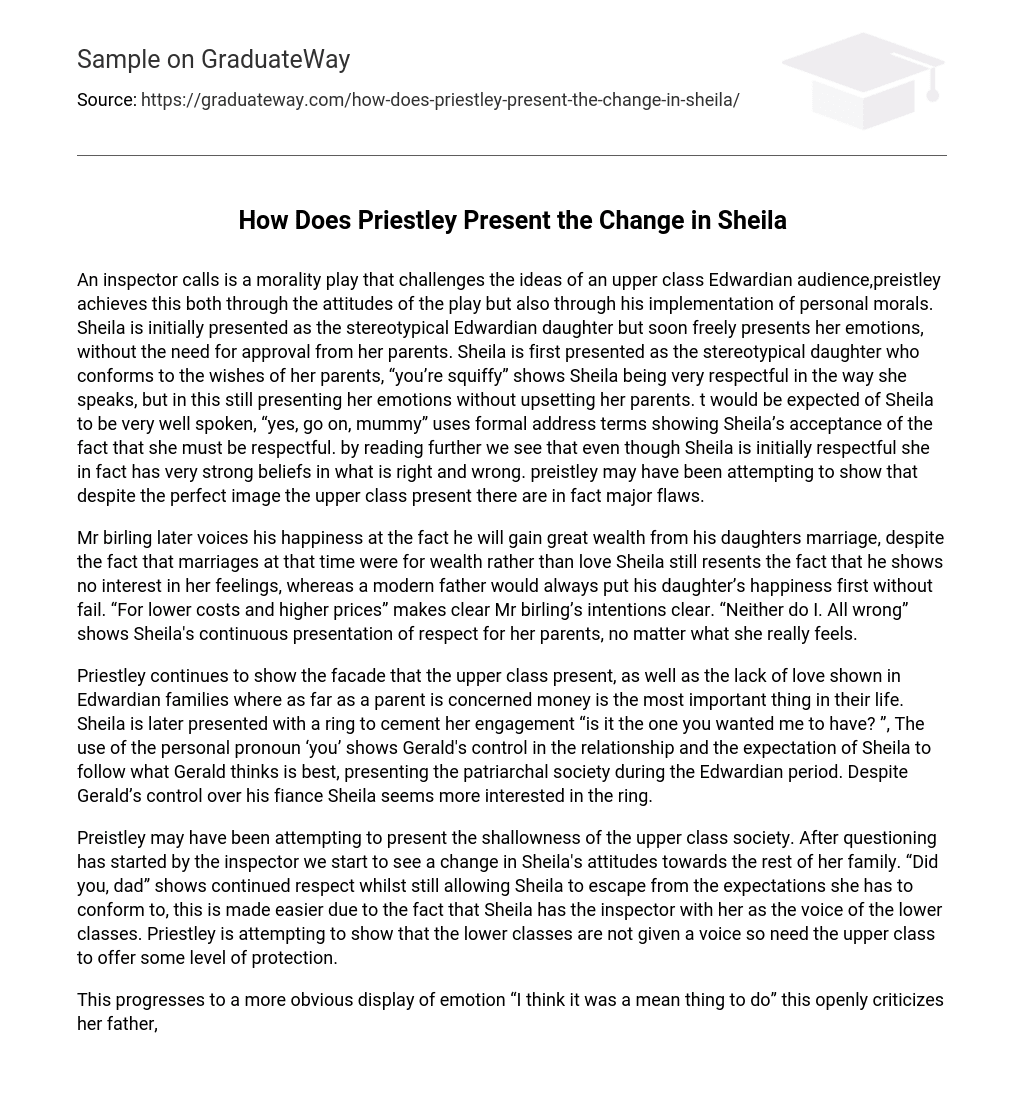An Inspector Calls is a morality play that challenges the ideas and attitudes of an upper class Edwardian audience. Priestley achieves this through both the content of the play and his personal moral beliefs. Initially, Sheila is portrayed as a stereotypical Edwardian daughter who conforms to her parents’ wishes. However, she gradually begins to express her emotions freely without seeking approval from her parents. Despite speaking respectfully, Sheila still manages to convey her emotions through phrases such as “you’re squiffy.” While it is expected for Sheila to be well-spoken and use formal address terms like “mummy,” as we delve further into the play, we discover that she has strong beliefs about right and wrong. By doing so, Priestley highlights the imperfections beneath the seemingly perfect image of the upper class.
Mr. Birling expresses his satisfaction about benefiting financially from his daughter’s marriage, even though marriages during that era were primarily driven by wealth rather than love. Despite this, Sheila is still resentful of the fact that he ignores her emotions. In contrast, a contemporary father would prioritize his daughter’s happiness above all else. The phrase “For lower costs and higher prices” reveals Mr. Birling’s intentions explicitly. Sheila consistently conveys deference to her parents, regardless of her true feelings, as proven by the statement “Neither do I. All wrong.”
Priestley continues to depict the false appearance of the upper class and the absence of love within Edwardian families, where money is prioritized by parents. Later on, Sheila receives a ring as a symbol of their engagement and asks, “Is it the one you wanted me to have?” By using the pronoun ‘you’, Gerald asserts his dominance in the relationship and expects Sheila to comply with his desires, illustrating the patriarchal nature of society during this era. Regardless of Gerald’s control, Sheila appears more captivated by the ring.
Preistley may have been attempting to depict the superficiality of the upper class society. As the inspector begins questioning, Sheila’s attitudes towards her family start to evolve. The phrase “Did you, dad” demonstrates ongoing respect while also enabling Sheila to detangle herself from the societal expectations she must conform to. This is facilitated by the presence of the inspector who represents the lower classes and allows Sheila to find a voice. Priestley’s aim is to illustrate that the lower classes lack representation and therefore rely on the upper class to provide a certain level of safeguarding.
In a more apparent manner, the expression of emotion advances with the statement “I think it was a mean thing to do,” openly criticizing her father. This action would have been both highly unexpected and severely punished in the past. With the inspector present, Sheila is able to demonstrate how the attitudes of younger generations have evolved. Priestley aimed to depict that the change in attitudes among the upper class would not happen instantly. Rather, it would be the younger generation that would initiate this shift in perspective towards the lower classes.
Before the inspector arrives at the Birling household, Sheila portrays herself as the ideal fiancé to Gerald, despite her awareness of an incident that occurred during the summer. She remains cautious with her words. However, when the inspector arrives and takes on a defensive role, Sheila transforms into an interrogator, inquiring about his knowledge of Eva Smith. Through this transformation, Priestley illustrates that as long as upper-class parents impose restrictions, the moral values of younger generations will not undergo any significant changes.
Despite the apparent lack of strength in Sheila’s relationship with her mother, when Mrs Birling is questioned, Sheila becomes very protective and pleads “no mother-please!” The use of the personal pronoun “mother” implies a deep bond between them, despite their perceived separation. It is likely that Mrs Birling, being part of the upper class, may not have spent much time with her daughter, as a nanny would have taken care of her. Priestley’s intention may have been to suggest that upper class families can still maintain close relationships, contrary to societal expectations.
When Sheila returns the engagement ring, it indicates a transformation in her maturity. She states, “you and I aren’t the same,” highlighting the impact the younger generation has on people’s morals and attitudes towards the lower class. Priestley implies that a change is necessary, but emphasizes that one individual cannot bring about this change alone. Sheila’s maturity further manifests as she deeply regrets her actions, exclaiming, “I behaved badly too.” This displays her genuine remorse for the consequences of her behavior. Priestley possibly suggests that the upper class should take more accountability for their actions.





